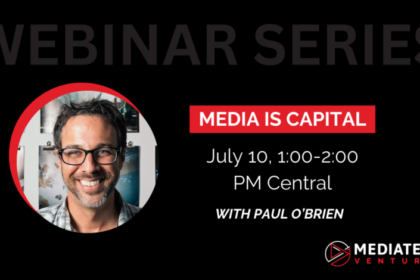
Article Highlights
- Possessing a compelling story outweighs merely having a brilliant idea so much so that media has become the new capital for burgeoning founders.
- The Power of Storytelling and Community
- Why Media is More Critical Than Capital for Startups
- Building a Thriving Community Around Your Brand
- Crafting a Powerful Pitch
Possessing a compelling story outweighs merely having a brilliant idea so much so that media has become the new capital for burgeoning founders.
The fundamental concept here is that media — encompassing storytelling, audience engagement, and community building, well beyond what you might consider it to mean in “the press” — serves as a powerful currency. For startups, especially in their early stages, the ability to attract and engage an audience can be more crucial than securing financial capital. Why? Because a passionate, engaged community can provide invaluable support, validation, and momentum that money alone cannot buy.
The Power of Storytelling and Community
At its core, a startup thrives on its ability to connect with people. A great story does more than just convey what your business does; it humanizes your brand, making it relatable and memorable. This narrative forms the backbone of your startup’s identity and helps differentiate you in a crowded market.
Consider the example of Airbnb. Early in its journey, Airbnb faced significant financial struggles. What helped them persevere was their compelling story and the community they built around the concept of belonging anywhere. Founders Brian Chesky and Joe Gebbia famously sold custom-designed cereal boxes to raise initial funds, a move that not only provided much-needed cash but also captured media attention and public imagination. This quirky, relatable story became a pivotal part of their brand identity, fostering a strong, supportive community.
Another powerful example is Red Bull, which, beyond giving you wings, we explore with founders in detail in our incubators. The company famously evolved from an energy drink company into a media powerhouse with a strategy revolving around creating content that resonated with its target audience—extreme sports enthusiasts and adrenaline junkies. They invested in producing high-quality videos, sponsoring extreme sports events, and even launching their own media house, Red Bull Media House. This venture produced a wide range of content, from documentaries to live event coverage, that not only promoted their product but also built a lifestyle brand around it. This approach has made Red Bull synonymous with extreme sports and adventure, far beyond just an energy drink.
Why Media is More Critical Than Capital for Startups
- Audience Engagement and Validation: When you build a strong media presence, you attract a community that believes in your vision. This audience acts as early adopters and brand advocates, providing critical feedback and validation that can guide your development and refine your product.
- Organic Growth and Virality: A captivating story and an engaged community can drive organic growth far more effectively than traditional advertising. Users who are emotionally invested in your brand are more likely to share your story, leading to viral growth—a phenomenon that paid marketing campaigns often struggle to achieve.
- Credibility and Trust: Media coverage and a robust online presence can significantly boost your startup’s credibility. Being featured in reputable publications or gaining traction on social media platforms builds trust with potential customers and investors alike. For instance, Tesla’s rise can be attributed not just to its innovative products, but to Elon Musk’s masterful use of media to craft a compelling vision of the future.
- Resource Efficiency: Leveraging media is often more cost-effective than extensive advertising campaigns. Crafting a compelling narrative and building a community requires creativity and strategic thinking more than substantial financial resources. Startups like Dollar Shave Club used viral videos to disrupt traditional markets without the need for massive advertising budgets, showcasing how media can level the playing field for smaller players.
Building a Thriving Community Around Your Brand
Building a community starts with understanding your audience and what resonates with them. It involves continuous engagement, authenticity, and delivering value beyond your core product. Social media platforms, blogs, and interactive content like webinars and podcasts are excellent tools for fostering this connection.
Glossier, a beauty startup, built its brand on community engagement and customer feedback. By actively involving their audience in product development and using social media to create a dialogue, Glossier cultivated a loyal following that propelled them to success without traditional advertising.
Crafting a Powerful Pitch
Your pitch must be more than a presentation of facts and figures or a fill-out of the pitch template some accelerator or article told you to fill out; it should be a story that resonates on an emotional level. It needs to convey not just what you do, but why you do it and why it matters. Simon Sinek’s Golden Circle model emphasizes starting with the “why” to create a deeper connection with your audience.
To measure the success of your pitch and overall media strategy, focus on engagement metrics: shares, comments, and community growth are more telling than simple view counts. And let me pause here because if you’re a startup founder, you likely thought I was referring to your Startup Pitch (a pitch deck), and I am… because your storytelling as a startup should be a varied and compelling as that which you create online to promote yourself. Tools like Google Analytics and social media insights can help track these metrics and refine the content you create, helping turn media into far more than likes.
For startups, media truly is the new capital. Embrace the power of story and community, as these elements can transform your vision into a thriving business. Building a strong narrative and engaging your audience are not merely supplementary tactics—they are fundamental to your startup’s success. By leveraging media effectively, you can achieve organic growth, build credibility, and foster a supportive community that money alone cannot buy.
For further reading, consider exploring resources such as “Building a StoryBrand” by Donald Miller or “This is Marketing” by Seth Godin, which delve deeper into the art of storytelling and community building in the digital age. These works provide practical insights and strategies that can help amplify your startup’s media presence effectively; this is *capital* that you can raise right now, making fundraising far easier when it comes to engaging and interesting investors in what you’re doing.



We couldn´t agree more.
It is certainly easier and cheaper than ever to deliver your message to your target audience. Of course, that just puts more pressure on you to get your message right. Just like for Hollywood, delivery may evolve but a good story is still needed first.
Steve Jennis well said. And thus too, it’s astounding to me that with it being so much easier and cheaper than ever before, founders don’t do it.
When I hear a founder pitch and say they need funding to do marketing, I cringe. When they want funding to run Paid Ads, and they aren’t doing anything else that’s free, I look at them with shock about how they could think they warrant funding from investors.
The movie analogy is apropos these days because it’s the word of mouth, the press, and the social media, that creates hype and awareness for a movie… startups could learn from that, they must be doing the same.
Will plan to tune in.
Story-Media is an exploding trend…
But “Findability for Authenticity” is the inflection point in the access to execution.
They must marry.
Dr. Carol J. Dickerson, Pharm D Findability for Authenticity. I love that and it’s so appropriate to founders in particular to appreciate… that, you can *say* you’re doing something, or that you want to, but if there is nothing to show for it, you’re not going to make any headway by getting support from others – no one takes a risk because you say so.
Media as a cornerstone for startup success is a brilliant insight. Stories and communities change how people connect with brands. Simon Sinek’s idea of starting with “why” shows us that a genuine story builds trust and loyalty. Donald Miller emphasizes clear messaging that resonates with your audience’s needs, encouraging organic growth. A media-driven strategy can elevate a startup beyond what capital alone can achieve. Authentic engagement through storytelling differentiates a brand in crowded markets. Startups should see media as a tool for creating lasting relationships that drive both growth and impact. Media isn’t just a tool—it’s the foundation for everything from customer trust to culture. This workshop sounds invaluable for aspiring entrepreneurs. Looking forward to it!